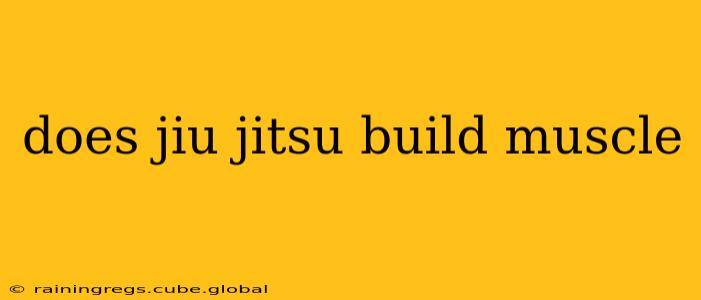Does Jiu Jitsu Build Muscle? A Deep Dive into Strength and Conditioning in BJJ
Brazilian Jiu-Jitsu (BJJ) is a grappling martial art renowned for its effectiveness in close-quarters combat. But beyond its self-defense applications, many wonder: does Jiu Jitsu build muscle? The answer is a resounding, nuanced yes. While BJJ might not build the same kind of bulky muscle mass as weightlifting, it delivers a unique type of strength and muscular development that's both functional and aesthetically pleasing.
This comprehensive guide explores the muscle-building aspects of BJJ, addressing common questions and misconceptions.
What Kind of Muscles Does Jiu Jitsu Build?
BJJ predominantly builds functional strength and lean muscle mass. You won't get the massive biceps of a bodybuilder, but you'll develop significant strength and definition in key muscle groups crucial for grappling:
- Core Muscles: BJJ intensely works your core – abs, obliques, and lower back – essential for maintaining balance, generating power, and resisting takedowns and submissions. Expect a strong, defined midsection.
- Back Muscles: Pulling guard, escaping submissions, and performing back takes significantly strengthens your lats, rhomboids, and trapezius muscles, leading to a broader, more powerful back.
- Legs and Glutes: Maintaining posture, executing takedowns, and controlling your opponent heavily engages your quads, hamstrings, glutes, and calves. You'll develop strong, powerful legs capable of explosive movements and sustained endurance.
- Arms and Shoulders: While not the primary focus, BJJ still works your arms and shoulders. Gripping, controlling limbs, and performing submissions build strength and definition in your biceps, triceps, forearms, and deltoids.
Does Jiu Jitsu Build Muscle as Much as Weightlifting?
While BJJ builds muscle, it's crucial to understand that it's not as effective as dedicated weight training for maximizing muscle hypertrophy (muscle growth). Weightlifting, with its focused resistance exercises and progressive overload, is specifically designed for muscle building. BJJ, on the other hand, is a dynamic, full-body workout that focuses on functional strength and endurance. Think of it as building a lean, athletic physique rather than a bulky one.
How Much Muscle Can You Build with Jiu Jitsu?
The amount of muscle you build with BJJ depends on several factors:
- Training intensity and frequency: More frequent, intense training sessions will lead to greater muscle growth.
- Diet and nutrition: Sufficient protein intake is essential for muscle repair and growth.
- Genetics: Individual genetic predisposition influences how your body responds to training.
- Supplementation (optional): Some athletes use supplements to support muscle growth, but this isn't necessary for seeing results from BJJ.
While you might not gain as much muscle mass as with weightlifting, consistent BJJ training will lead to noticeable improvements in strength, muscle definition, and overall physique.
Will Jiu Jitsu Make Me Bigger or Stronger?
BJJ will make you stronger, undoubtedly. It builds functional strength, which translates to real-world applications beyond the mat. Whether it makes you "bigger" depends on your definition of bigger. You might not gain significant weight, but your body will become more defined, leaner, and more powerful.
Is Jiu Jitsu Good for Building Muscle and Losing Fat?
Yes, BJJ is excellent for both muscle building and fat loss. The high-intensity nature of training burns calories and improves cardiovascular health. Combined with a healthy diet, BJJ is an effective way to achieve a lean, muscular physique.
In conclusion, Jiu Jitsu is an excellent way to build muscle, but it's a different kind of muscle building compared to weightlifting. It prioritizes functional strength and lean muscle mass, resulting in a strong, athletic physique ideal for grappling and overall fitness. It's a holistic approach to fitness that combines strength, endurance, and flexibility, making it a rewarding and effective martial art for those seeking both physical and mental challenges.
